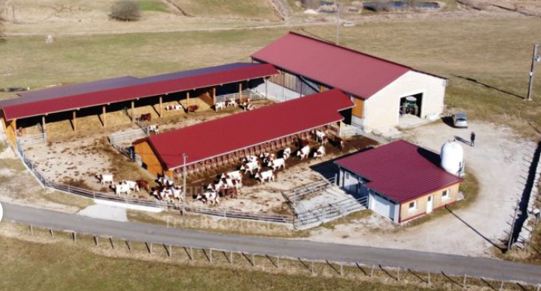General
Slovakia is located in Central Europe and has an agricultural sector that plays an important role in both the economy and the culture of the country. There are about 85,000 farms in Slovakia. Among these farms are both small family businesses and larger commercial enterprises.
Slovakia has a total population of approximately 5.5 million people, with a portion of the population still living in rural areas and involved in agriculture. The agricultural sector contributes not only to food production and the country’s economy but also to the preservation of rural life and Slovakia’s traditional farming culture.
Agriculture
Dairy farming
Dairy farming is one of the most important branches of the agricultural sector in Slovakia. The country has around 2,500 dairy farms. Dairy farming is concentrated in various regions, including the Tatra Mountains, the western lowlands, and parts of the south.
Farmers often receive support from government programmes and subsidies to improve productivity and ensure the quality of their dairy products. Milk production is a crucial part of Slovakia's agricultural economy and contributes to the production of dairy products for both the domestic market and export.
Arable farming
In addition to dairy farming, arable farming is also a significant sector in Slovakia. The country has about 22,000 crop farms that grow a wide variety of crops, including wheat, barley, corn, potatoes, sugar beets, and various vegetables and fruits. The agricultural areas in western and southwestern Slovakia, where the soil and climate are favourable, are often key regions for crop farming.
Climate
Slovakia has a temperate climate with warm summers and cold winters. During the summer months, average temperatures range between 20°C and 25°C, while winter months vary between -5°C and 0°C, with significant snowfall in the mountainous areas.
Slovakia’s climate impacts the agricultural sector. The seasonal nature and extremes in temperature and precipitation can bring both challenges and opportunities for farmers.
In the summer months, farmers generally benefit from longer days and warmer temperatures, allowing crops such as grains, corn, and sunflowers to thrive. In the winter, cold temperatures and heavy snowfall can complicate agricultural activities, especially for crops that are sensitive to frost.
Social affairs
Slovakia’s healthcare system is based on universal health insurance, which is mandatory for all citizens. Pensions are provided through the social security system, with retirement age varying depending on the type of pension. For farmers, farm insurance is available to protect crops and livestock against risks such as bad weather and diseases.


